By:
- Amanda Rubalcava
Published Date
By:
- Amanda Rubalcava
Share This:
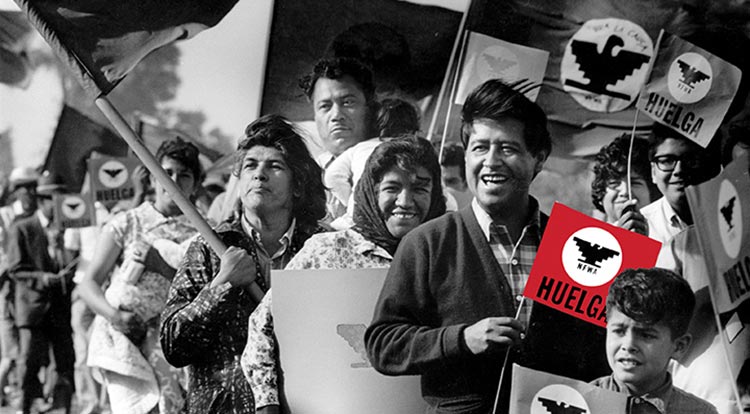
UC San Diego Honors the Life and Legacy of César Chávez
Students, faculty and staff reflect on the impact of the labor and civil rights leader
This April, the University of California San Diego presents a monthlong celebration in honor of the life and achievements of Mexican American labor leader and civil rights activist César E. Chávez. The campus has curated a lineup of in-person and virtual programs that highlight this year’s national theme, "Sustaining Chávez's Legacy.” From an inspiring keynote presentation to a conversation with an innovative Chicanx playwright, each event reflects Chávez’s commitment to social justice and respect for human dignity.
2022 also marks the 21st Annual César E. Chávez Celebration Kickoff and Scholarship Awards. On April 7, campus and community members are invited to Price Center for a free event that brings awareness to the contributions and impact of the Chicanx-Latinx community. Alongside recognizing award recipients who embody Chávez’s ideals in their lives and work, the celebration features a guest speaker, special performances, a boxed lunch and more.
As a principal figure of the Chicano Rights Movement alongside Dolores Huerta, Chávez’s efforts have made him a symbol of empowerment for social change. An iconic activist committed to nonviolent resistance and justice, his legacy is present on campus and around the world. In the same spirit of his core values, UC San Diego is dedicated to supporting efforts that cultivate a more equitable, inclusive community where all can thrive.
To ring in the start of UC San Diego’s César E. Chávez celebration month, we invited students, faculty and staff to join in a conversation around the impact of his work and legacy.
What does living out César E. Chávez's legacy mean to you?
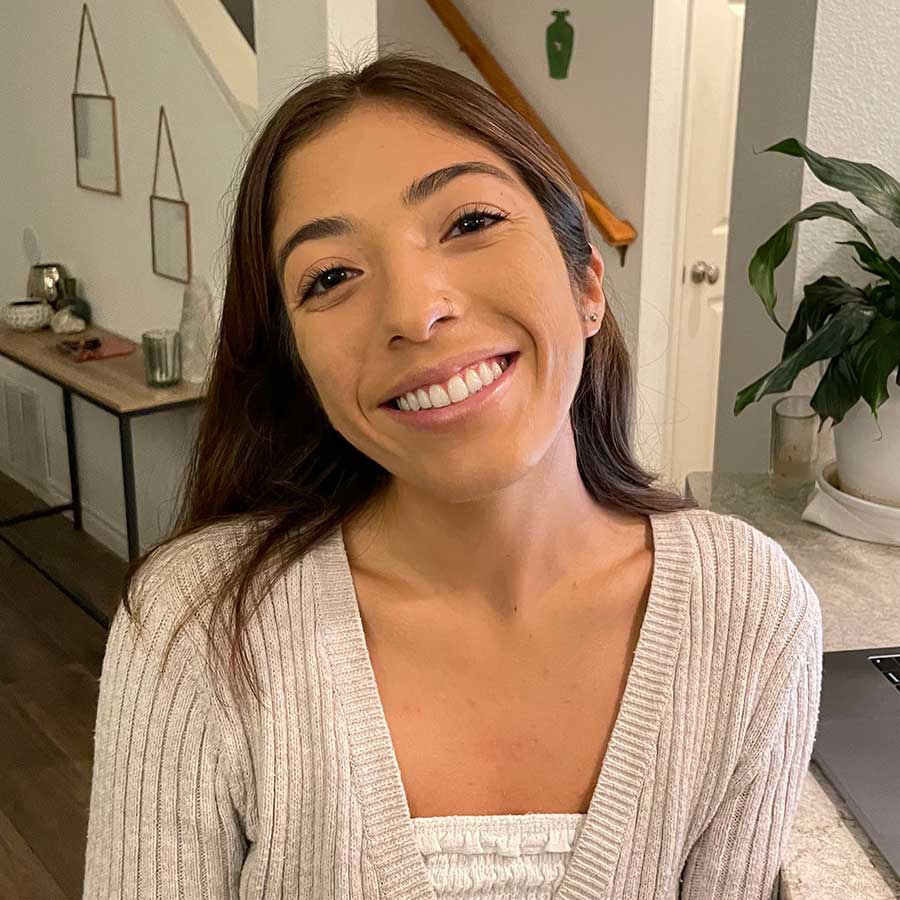
Fatima Maciel. Photo courtesy of Fatima Maciel.
“Living out César Chávez’s legacy to me means continuing to fight against the injustices that institutions have structured to oppress people of color in the United States. César E. Chávez was an advocate for social change and mobility and he showed that through his active role in achieving equitable rights for farmworkers in our nation. His celebration serves as a reminder that there is power in unity! As members of this nation, we are present, we have a voice, we matter. Regardless of what others say or think about us, we know who we are, we know what we stand for, and no criticism or discriminative policy will stop us from resisting and dismantling oppressive institutions. Together, we must uplift and amplify each other regardless of race, gender, religion, sexuality or age, because we cannot be free until all of us are.”
—Fatima Maciel, public policy and ethnic studies undergraduate student, Raza Resource Centro 2022-23 Learning Specialist
“There’s a quote from a great educational leader, Lucio Cabañas, from my home state of Guerrero, in México, that says ‘Ser pueblo, hacer, estar con el pueblo.’ That quote for me epitomizes living out Chávez’s legacy. Roughly translated it means, to be of the community, to create community, and to be in [solidarity] with the community. Although Chávez organized much after Lucio, I think the spirit holds true that in order to carry forward a legacy of struggle, equity, and justice, community has to be at the center of it all.”
—Belinda Zamacona, Chancellor’s Associates Scholars Program (CASP) Director
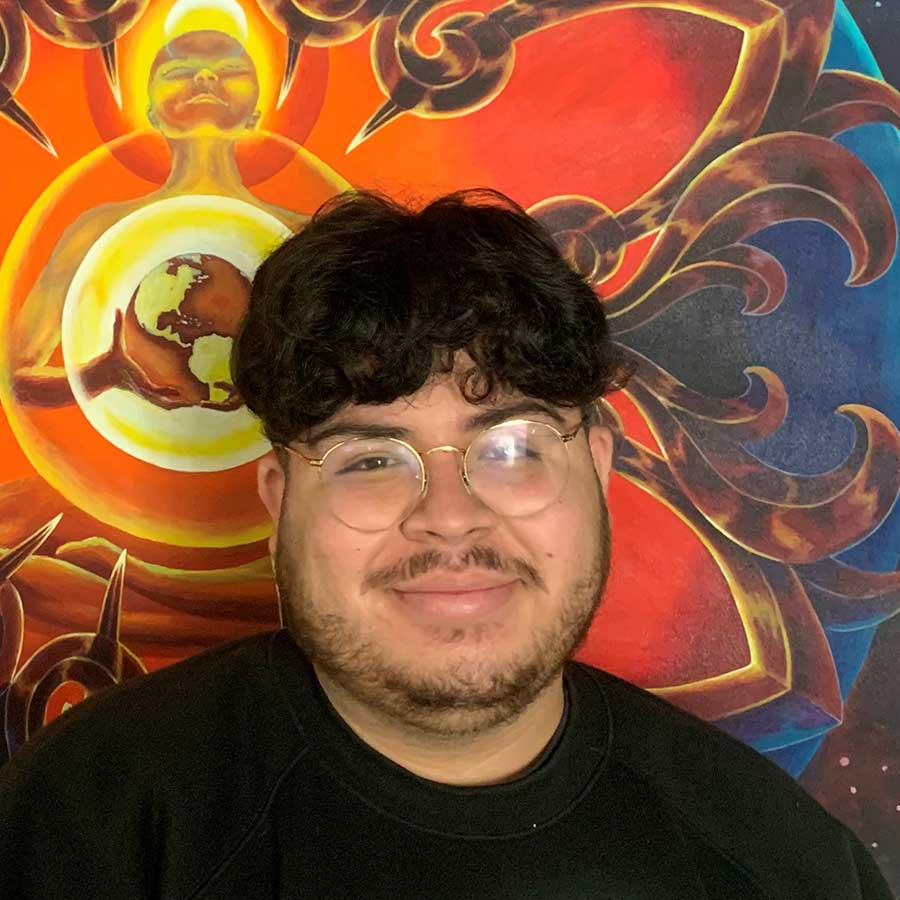
Brandon Najera. Photo courtesy of Brandon Najera.
“When it comes to living out César Chávez’s legacy, I believe it is important to focus more on the work he did. I know that César Chávez was not the perfect idol, but to me what’s more important is continuing the work he did. What he did was very revolutionary for the Latinx community and that’s what I want to do. It’s important to carry that activism ethic and help out our community since it needs a lot of support from us. As a student, it is important to continue to serve and give back to the community. The farmworkers movement is one that inspired students and MEChA to come together and organize, so of course I have to continue that legacy that students were inspired by.”
—Brandon Najera, ethnic studies and history undergraduate student, Cross-Cultural Center Affiliates and Leadership Intern, Movimiento Estudiantil Chicano de Aztlan (MEChA) Chair Member
“I can answer that in two words. Radical inclusivity. My lens is from El Teatro Campesino, which was the farmworkers’ theatre created by the great Luis Valdez. Using his own citizenry and artistry, Valdez created this extraordinary theatre company to highlight and create change within the farmworker experience and to tell stories from that lens. Whenever I teach my classes on the history of Luis Valdez or El Teatro Campesino, you can't begin without starting with César Chávez. But, it’s also important to understand all the other people who fought for farmworkers’ rights, such as the Filipino community. It was just that radical inclusivity of different people with the same cause working towards equity and social justice that for me is truly inspiring.”
—Robert Castro, Professor of Theatre & Dance, Chicanx and Latinx Studies Director
Chávez often said that his job as an organizer was to help ordinary people do extraordinary things. Can you share an effort led by you or others that has inspired you recently?
“Throughout my educational career, all I’ve ever known is the history of white America. The misrepresentation of ethnic groups in our education system is why ethnic studies has motivated me to reclaim the voices and history of those marginalized. The push for ethnic studies [curriculum] in our K-12 system has encouraged me to engage in research specifically to look deeper into education policy. I believe everyone should be given the opportunity to full participation in an education that represents their background. I hope that with the incorporation of critical race studies, we can reach a point where no individual has to ever doubt their intelligence, hard work and position in society because of their identities. I truly value the power of knowledge and its ability to change our perspectives on how we observe the world.”
—Fatima Maciel, public policy and ethnic studies undergraduate student, Raza Resource Centro 2022-23 Learning Specialist
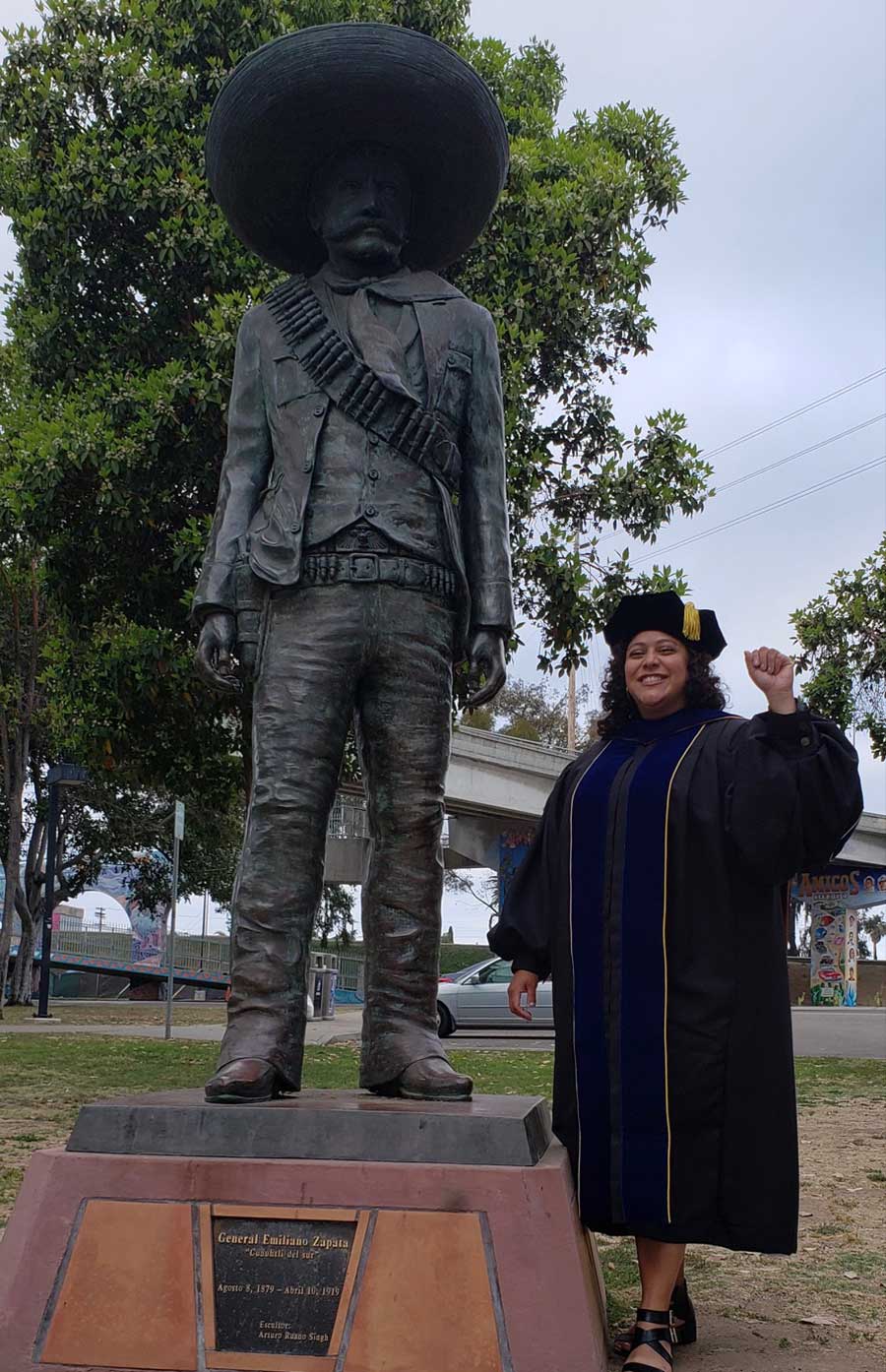
Belinda Zamacona. Photo courtesy of Belinda Zamacona.
“Students fighting, organizing and teaching us to do better during a global health pandemic has inspired me, and continues to inspire me. I am honored to serve students that are constantly challenging the ways in which marginalized communities have been kept at the fringes and bring about and demand change each and every day.”
—Belinda Zamacona, Chancellor’s Associates Scholars Program Director
“In regards to something that I have helped be a part of recently, I feel I have helped Latinx students find community within campus. While that may not be revolutionary, I believe that it is important that students feel welcomed and that students in the San Diego community can feel like they can be in the role that I am here at UC San Diego. So, that’s what I would say I’ve been doing—creating community and helping provide some form of access through MEChA.”
—Brandon Najera, ethnic studies and history undergraduate student, Cross-Cultural Center Affiliates and Leadership Intern, MEChA Chair Member
“I was recently inspired by an art project of a traveling giant puppet named Little Amal, which was a key part of a performance called “The Walk.” Little Amal is a young Syrian refugee, and the puppet made a 5,000 mile journey from Turkey all the way to England. The project was this wonderful kind of parade and procession—a true kind of magical interaction of creating awareness of the experience of refugees traveling across the continent. What I love about it was that ultimately the creators called it ‘a traveling festival of art and hope.’”
—Robert Castro, Professor of Theatre & Dance, Chicanx and Latinx Studies Director
Throughout his life, Chávez was dedicated to bettering the lives of others and was committed to social justice. What is one social justice cause that you are passionate about and why?
“When I was in elementary school, my parents disclosed their citizenship status to me as undocumented immigrants. The criticism I heard both on and off-screen regarding undocumented immigrants forced me to become ashamed of my heritage. It took a great deal of time and self-reflection to realize the importance of staying true to my roots. With a stronger appreciation for my parent’s sacrifices and culture, I’ve managed to turn an unfavorable situation into my motivation. The battle against discrimination that immigrants and the Latinx community face continues, but the controversy has inclined me to work tirelessly. I’ve persisted in my education, in hopes of expanding my contributions to my community and helping the fight against anti-immigration policies that target minorities in America.”
—Fatima Maciel, public policy and ethnic studies undergraduate student, Raza Resource Centro 2022-23 Learning Specialist
“I don’t think as a society we have the privilege of focusing on just one cause to rally around. And I think the continued exploitation of labor for profit above all else is a social ill that can no longer be ignored. I am proud of the organizing work that our students and community are doing to better working conditions for all, on and off campus.”
—Belinda Zamacona, Chancellor’s Associates Scholars Program Director
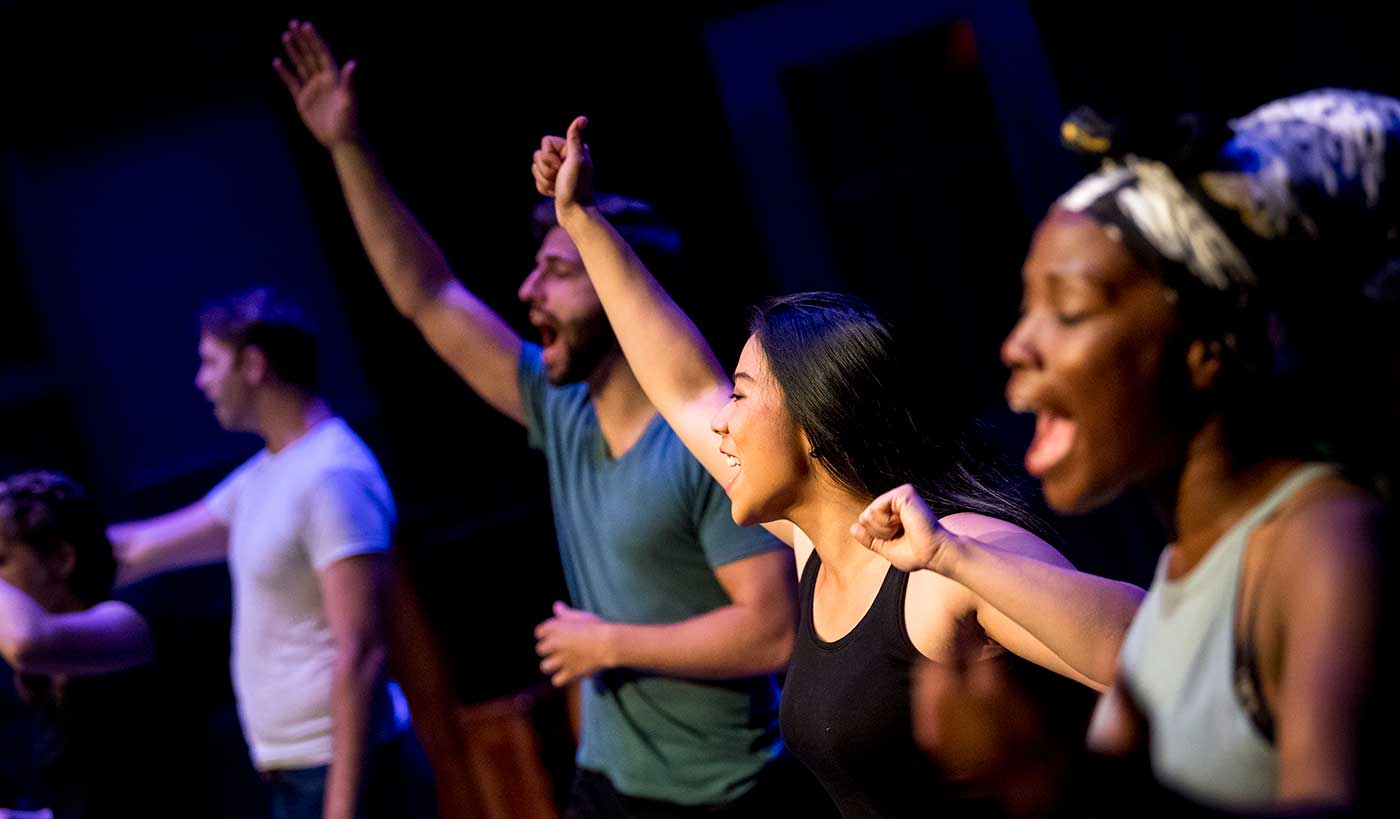
Robert Castro (not pictured) is a faculty member in the Department of Theatre and Dance. Photo by Erik Jepsen/University Communications.
“When it comes to social justice. I feel there is so much I am passionate about! If I had to choose one thing to share, it would be ensuring students feel welcomed and represented in places like UC San Diego. I am passionate about this because there are students like myself who are constantly told we aren’t able to achieve things. I am from East Los Angeles. We are kept in a box where we only work in the community and cannot pursue our goals and dreams. As someone who was constantly being put down in my community, it is my goal to help uplift students who were in my situation and want to chase their dreams of higher education. Now, as an upcoming graduate, I’ve realized it’s important to share my story to continue to push and inspire students to chase more than what they are told is out there for them.”
—Brandon Najera, ethnic studies and history undergraduate student, Cross-Cultural Center Affiliates and Leadership Intern, MEChA Chair Member
“Something that I've been thinking about a lot is this idea of borders. The incredible, queer Chicana feminist Gloria Anzaldúa embraced the concept of ‘nepantla,’ which is a Nahuatl word representing ‘in-between-ness’ that she applied in terms of the Chicano experience. She likened this concept to a place of potentialities and possibilities where anything can happen. She has this incredible quote—‘I am a turtle, wherever I go I carry home on my back.’ This idea of migration and borders is challenging because people want home, and often move because of forces beyond their control. We have a longing for home, but perhaps our home is already within us. Further, for me, borders allow and demand imagination, creativity and resilience.”
—Robert Castro, Professor in the Department of Theatre and Dance, Chicanx and Latinx Studies Director
UC San Diego honors Chávez with a statewide holiday on his birthday, March 31, which is observed at UC San Diego annually. To learn more about this year’s events and programming, please visit the César E. Chávez campus celebration webpage.
Share This:
Stay in the Know
Keep up with all the latest from UC San Diego. Subscribe to the newsletter today.



